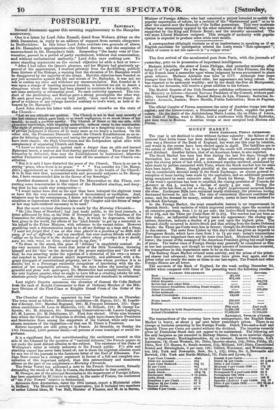POSTSCRIPT. SATURDAY.
Several documents appear this morning supplementary to the Hampden controversy. Several documents appear this morning supplementary to the Hampden controversy. One is a letter by Lord John Russell, dated from Woburn Abbey on the 30th December, in reply to an address of support from certain clergymen in Bedfordshire. In this letter Lord John combats two grounds of alarm at Dr. Hampden's appointment—the Oxford decree; and the suspicion of tuosoundness in Dr. Hampden's faith. Respecting "the hasty vote of Con- vocation, passed in a period of party excitement, without due examination, and without ecclesiastical authority," Lord John says nothing new. To some standing arguments on the second objection he adds a fact or two— "After I had taken the Queen's pleasure, and her Majesty had graciously sip- . • .ed of the appointment, I received privately from the Archbishop, publicly
• thirteen of the Bishops, a warning that the elevation of Dr. Hampden would be disapproved by the majority of the clergy. Had this objection been founded on any just accusation against the life and morals of Dr. Hampden, it was not too late to confess my error and withdraw my recommendation. But, founded as it was upon a charge of teaching unsound doctrine, it behoved me not to desert a clergyman whom the Queen had been pleased to nominate for a bishopric, with- out some authority or substantial proof. No such authority appeared. The con- duct of the Archbishop and Bishops gar a strong presumption the other way. No such proof was given; you say very justly, 'none such have we found; no proof or evidence of any strange doctrine contrary to God's word, as held or fa- voured by Dr. Hampden." "
Lord John closes his letter with some general remarks on the state of the Church-
" Let us not mistake our position. The Church is not in that easy security of the last century which gave birth to so muoh nogligenco, to ao much abuse of her wealth, to such a posiious apathy. The Church of Rome on the one side, with abaaaant knowledge, with imposing authority, seduces many to her communion. The right of private judgment is by many avoided as a dangerous snare; the duty of private judgment is thrown off by many more as too heavy a burthen. On the other side, the Protestant Dissenter assails the Church Establishment. as an en- gine for fettering the conscience and taxing the property of the subject. Novelties have their charm; the High Churchman and the Independent speak alike with complacency of separating Church and State. "I know no better security against such a danger than an able and learned Episcopal bench, a zealous and God-fearing parochial clergy. Thus may the Re- formation be defended; thus may the Establishment be maintained : otherwise neither Parliament nor prremunire can beat off the assailants of our Church con- stitution.
"But it is said I have disturbed the peace of the Church. There is no use in crying peace, when there is no peace.' * * • You consider his [Dr. Hamp- den'sj appointment as 'a circumstance favourable to the health of the Church.' It is in that view that, unconnected with and personally unknown to Dr. Hamp- den, I have recommended him to the favour of my Sovereign."
Another document is a letter from Dr. Merewether to the Times, cor- recting some inaccuracies in the report of the Hereford election, and deny- ing that he has made any compromise-
" I would rather have died on the spot than have betrayed the slightest trace or have felt the very minutest sensation of inconsistency or vacillation. And, whatever may be the consequences, I desire not to shelter myself under any tech- nicalities or expressions which the claims of the Chapter and the forms of usage or law may have rendered necessary to be used."
But the most curious disclosure is made by the Morning Chronicle—
"Be [the Dean of Hereford] had just made public, in the local journals, a letter addressed by him, on the 30th of November last, to the Chairman of the Committee for obtaining signatures, &c. Stc..; in which he deprecates, with the best grace in the world, the efforts of his kind friends' to get up a memorial on his behalf to the Prime Minister, with reference to the vacant mitre. However gratifying such a demonstration must be to all my feelings as a Man and a Dean, • must not forget that lam at -this time placed in a position of no little deli-
cacy, if not of diyiculty' ; and my excellent but over-zealous friends will really 'oblige me by leaving it to the decision of others whose province it is to decide, AND TO TR& WILL OF GOD, what may be myfate.' • • • "To those in the secret, this piece of delicacy' is exquisitely comical. At the very moment the Dean wrote that letter of the 30th November, throwing himself and his 'fate' on the decision of the proper authorities and the will of God,' he was smarting under the rejection of a memorial of his own—a memo- rial couched in terms of almost abject importunity, and addressed, with a fla- grant disregard of constitutional propriety, not to those whose province it is to , decide,' but to a Personage eminently scrupulous of interfering with the dis- cretion of her responsible advisers. Not tan days before the penning of this graceful and pious nob o episcopari, Dr. Merewether had actually received, from the very highest quarter, what he ought to have felt as a crushing rebuke for soli- citations grossly unpile:1. in form, and utterly mean and mendicant in substance."






























 Previous page
Previous page